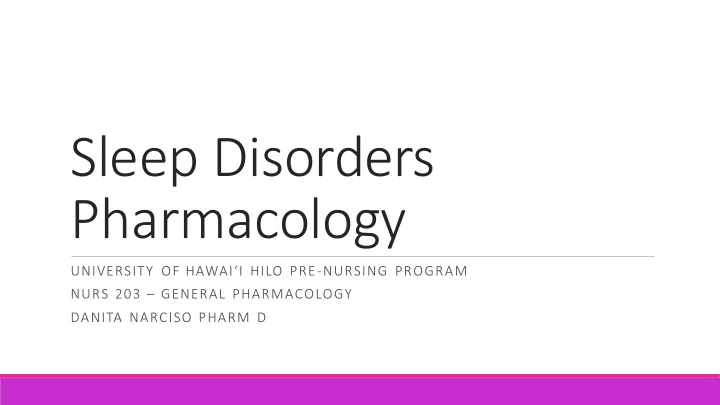

Sleep Disorders Pharmacology UNIVERSITY OF HAWAI‘I HILO PRE -NURSING PROGRAM NURS 203 – GENERAL PHARMACOLOGY DANITA NARCISO PHARM D
Learning Objectives Understand how circadian rhythms effect sleep Know the characteristics of the agents used for sleep
Overview Normal sleep habits and patterns What happens in insomnia OTC medications used to promote sleep ◦ Diphenhydramine ◦ Multiple products ◦ Doxylamine ◦ Melatonin RX medication used to promote sleep ◦ Barbiturates ◦ Benzodiazepines ◦ Z-drugs ◦ Melatonin
What’s the big deal? Why is sleep so important? ◦ Stay awake during the day ◦ Attention and memory function ◦ Feeling good – emotional health ◦ Prevent injury (falls) ◦ Reduce requirement for sleep aids ◦ Higher quality of life
Under Normal Circumstances Circadian rhythm Active Protein Active Protein
How we feel “awake” HIS+ HIS+ HIS+ GLU+ 5HT NE SCN
How we feel “sleepy” GABA GABA GABA GABA Adenosine
How we feel “sleepy” Adenosine
Insomnia How do you know if you suffer from insomnia? ◦ Difficulty falling asleep or staying asleep for 1 month (or non-restful sleep) ◦ Lack of sleep or quality of sleep causes significant distress or ability to function ◦ Not due to another condition or sleep disorder ◦ Not due to mental illness ◦ Not due to another substance
OTC - Benadryl MOA – antagonist at the histamine receptor Sleep dosage ◦ 25-50 mg at bedtime (QHS) Dosage forms for sleep ◦ Oral ADRs ◦ Sleep hangover, paradoxical excitation, anticholinergic Use with caution in elderly ◦ Paradoxical excitation (children too) ◦ Falls Onset – 30-60 minutes Duration – 4-8 hours Tolerance may occur with long-term use Interactions ◦ CYP2D6 substrates/inhibitors ◦ Safe in pregnancy
OTC - Doxylamine MOA – Antagonist at the histamine receptor Sleep dosage ◦ 25mg at bedtime (QHS) Dosage forms for sleep ◦ Oral ADRs ◦ anticholinergic Not recommended for use in children <12 years Time to peak – 2-4 hours Half life – 10-12 hours Drug-drug interactions ◦ CNS depressants Pregnancy category C ◦ CI in nursing
RX - Barbiturates Phenobarbital ADRs ◦ MOA – bind to BZD channel and keep it open ◦ Bradycardia, hypotension, agitation, drowsiness, allowing the continuous influx of GABA confusion, hangover, constipation, N/V, respiratory depression ◦ Use for treatment not recommended ◦ Sedative uses Interactions - MANY ◦ Mental health patients w/insomnia ◦ Potentially dangerous and fatal, especially when ◦ Psychoses combined with alcohol ◦ Kinetics ◦ Major CYP3A4, 2D6, 1A2, 2C9 inducer, substrate for 2C19 ◦ Onset – 20-60 minutes (oral) ◦ Pregnancy B/D ◦ Duration – 6-10 hours ◦ Can cause seizures and withdrawal in infant ◦ Half life – long, varies with age ◦ Detected in breast milk ◦ Excreted in urine
RX - Benzodiazepines Temazepam (Restoril) ADRs ◦ Increased falls, amnestic effects, respiratory MOA – enhances the inhibitory effect of GABA depression, daytime sedation, withdrawal, addiction, tolerance, rebound insomnia, altered Kinetics sleep patterns ◦ Half life – 3.5-18.4 hours Pregnancy category X ◦ Time to peak – 1.2-1.6 hours ◦ Detected in breast milk ◦ Metabolism – Liver, glucuronidation ◦ Excreted – Urine Considered intermediate acting ◦ Not too long – hang over ◦ Not too short - addiction
RX – Z Drugs Ambien – Zolpidem Advantages ◦ Less dependence, tolerance, & abuse Lunesta – Eszopiclone Sonata – Zaleplon MOA - HYPERPOLARIZES the cell – making the neuron less likely to fire (inhibitory). ◦ Much like benzodiazepines
Ambien MOA – Selective agonist of the BZD1 receptor ADRs – works much like benzodiazepines ◦ Headache, drowsiness, dizziness Kinetics Interactions ◦ Onset – 30 minutes ◦ Major 3A4 substrate (CYP3A4 inhibitors), alcohol, other CNS depressants ◦ Duration – 6-8 hours ◦ Metabolized – CYP enzymes (mostly 3A4) Pregnancy category C ◦ Half life – About 2.5 hours, increased in liver ◦ Secreted in breast milk disease ◦ Excretion – urine & kidney at metabolites
Lunesta Sonata Half-life – 6 hours – Elderly 9.9 hours Can be helpful to patient who have trouble staying asleep Time to peak – about 1 hour Half life – about 1 hour Excretion – mostly urine as metabolites Time to peak – about 1 hour
RX – Melatonin (Ramelteon) MOA – Potent agonist of melatonin receptors ADRs 1&2 which are found in the suprachiasmic ◦ Dizziness, somnolence, fatigue, depression, nucleus to induce sleep when activated nausea, upper respiratory infection Kinetics Interactions ◦ Onset 30 minutes ◦ CYP1A2 substrates & inhibitors, CNS depressants ◦ Half life – 1-2.6 hours, metabolite 2-6 hours ◦ Metabolism – liver with large 1 st pass effect, Pregnancy category C active metabolite ◦ Unknown if excreted in breast milk ◦ Time to peak – 0.5-1.5 hours ◦ Excretion – Mostly urine as metabolites Studied to be most useful in jet lag related insomnia OTC available
Questions
Recommend
More recommend